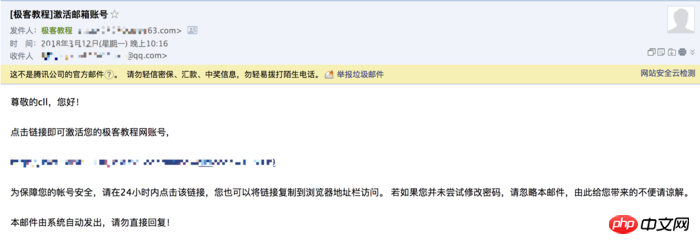
Nowadays, many websites need to have the registration email activation function. This article mainly introduces the example of the method of realizing the registration email activation function in Node.js. Now I share it with you and give it as a reference. Let’s take a look together
When doing geek tutorials on your own node project, you need to develop a function for registering email activation. This function is very common. When we register an account, there will definitely be this step, as follows Let’s see how to implement this function.
1. Register an email address
First register an email address that supports sending verification emails. The one I registered here is NetEase’s 163 email address, so the 163 email address is used below. After successful registration, log in to the sending email address
, then click Settings on the navigation bar, select POP3/SMTP/IMAP, enable the POP3/SMTP/IMAP service, and set the authorization code.
2. Download the nodemailer plug-in
Enter on the command line: npm install --save nodemailer
3. Write and send Email code
3.1 Encapsulate the activation email code and export it:
//email.js
// 引入 nodemailer
const nodemailer = require('nodemailer');
// 创建一个SMTP客户端配置
const config = {
host: 'smtp.163.com',
port: 465,
auth: {
user: 'xxxx@163.com', //刚才注册的邮箱账号
pass: 'xxxxxx' //邮箱的授权码,不是注册时的密码
}
};
// 创建一个SMTP客户端对象
const transporter = nodemailer.createTransport(config);
// 发送邮件
module.exports = function (mail){
transporter.sendMail(mail, function(error, info){
if(error) {
return console.log(error);
}
console.log('mail sent:', info.response);
});
};3.2 Test:
//sendtest.js
var send = require('./email.js');
// 创建一个邮件对象
var mail = {
// 发件人
from: '极客教程 <xxxx@163.com>',
// 主题
subject: '[极客教程]激活邮箱账号',
// 收件人
to: 'xxxx@qq.com',
// 邮件内容,HTML格式
text: `尊敬的${user.name},您好!点击链接即可激活您的极客教程
网账号,http://localhost:3000/checkCode?name=${user.name}&code=${user.code}为保障您的帐号安全,请在24小时内点击该链接,您也可以将链接复制到浏览器地址栏访问。 若如果您并未尝试修改密码,请忽略本邮件,由此给您带来的不便请谅解。本邮件由系统自动发出,请勿直接回复!` //接收激活请求的链接
};
send(mail);If successful, you can see the message sent in the test mailbox.

4. Verification steps
Let’s briefly talk about how to implement email verification.
1. In the database user data structure you define, there must be fields such as activation code, expiration time, and whether it has been activated, which are used to judge during activation;
{
code: String, //激活码,格式自己定义
date: Number, //过期日期,过期后不能激活
islive: Boolean //判断是否激活
}2 . Send an activation link containing your username and activation code, like this:
// 创建一个邮件对象
var mail = {
// 发件人
from: '极客教程 <xxxx@163.com>',
// 主题
subject: '[极客教程]激活邮箱账号',
// 收件人
to: 'xxxx@qq.com',
// 邮件内容,HTML格式
text: `尊敬的${user.name},您好!点击链接即可激活您的极客教程
网账号,http://localhost:3000/checkCode?name=${user.name}&code=${user.code}为保障您的帐号安全,请在24小时内点击该链接,您也可以将链接复制到浏览器地址栏访问。 若如果您并未尝试修改密码,请忽略本邮件,由此给您带来的不便请谅解。本邮件由系统自动发出,请勿直接回复!` //接收激活请求的链接
};
send(mail);3 . Respond to the activation request , search based on the user name of the activation link. If the user exists, determine whether the activation code is consistent, and determine whether the activation code has expired. If all are correct, change the activation status. At this time, the activation is successful, as follows:
// check email code
exports.checkCode = function (req, res){
var username = req.query.name;
var code = req.query.code;
User.findOne({name: username}, function (err, user){
if (user.code === code && (user.date - Date.now()) > 0){
User.update({name: username}, {islive: true}, function (err){
if (err){
res.json({error: true})
}else{
console.log(user)
res.json({ok: true})
}
});
}else{
res.json({
email: user.mail,
failure: true
})
}
});
}5. Problems encountered
The following problems were encountered during development:
{ [AuthError: Invalid login - 535 Error: authentication failed]
name: 'AuthError',
data: '535 Error: authentication failed',
stage: 'auth' }
smtp server verification failed because NetEase's email has authorization restrictions. Be sure to check the account number and authorization code when you registered your email.
Related recommendations:
Node.js implements compression and decompression
Instance of Node.js implementing Restful style webservice
The above is the detailed content of Example of how Node.js implements registration email activation function_node.js. For more information, please follow other related articles on the PHP Chinese website!




